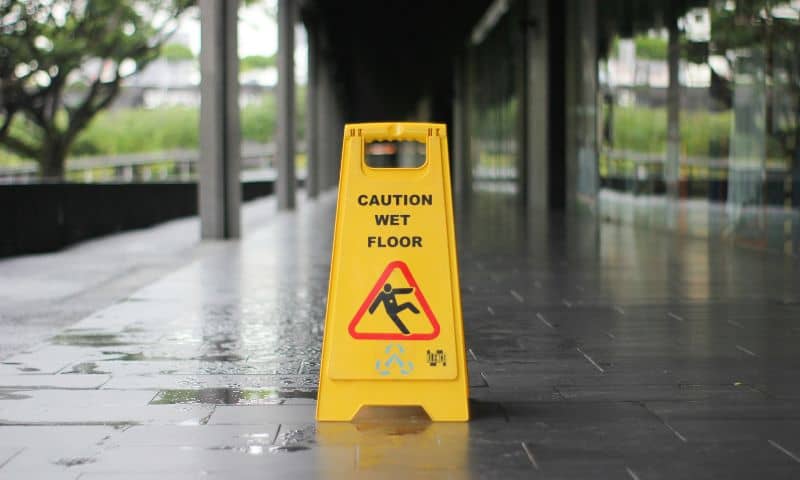Are Wet Floor Signs Required by Law?

Slipping and falling seems like a common mishap, but it can lead to serious injuries. In fact, falls are the leading cause of injury in America today. They frequently occur in public places like stores and restaurants where floors become wet and slippery.
As a property owner, you want to keep people safe. But do you need to put out wet floor signs to avoid liability? Or are there other ways to prevent slips and falls?
We’re going to dig into OSHA’s standards on slip and fall hazards. We’ll also discuss alternatives beyond just signs so you can make an informed decision. The goal is keeping everyone who enters your premises safe and injury-free.
OSHA Wants to Prevent Slips and Falls But Doesn’t Explicitly Require Signs
The Occupational Safety and Health Administration (OSHA) is responsible for ensuring safe workplaces. Under the General Duty Clause, employers must provide employees with a work environment free from recognized hazards likely to cause harm.
Clearly, slippery floors qualify as dangerous conditions that can lead to injuries. In fact, OSHA estimates that slips, trips and falls account for 20% of all accidental deaths per year.
OSHA regulation 1910.22 specifically requires employers to ensure all places of employment are kept clean and dry. However, the standards don’t mandate posting wet floor signs or using any other specific method of warning customers about slippery surfaces.
In 2010, OSHA proposed new regulations that would explicitly require posting temporary floor signs whenever spills created slippery conditions. However, these proposed rules were never formally implemented.
So, in short—OSHA wants businesses to prevent slips and falls but doesn’t outright require the use of wet floor signs or cones.
Premises Liability Laws Generally Require Businesses to Warn About Dangers
Just because OSHA doesn’t specifically mandate wet floor signs doesn’t mean companies have no obligation to warn about hazards. Under premises liability laws, property owners must make reasonable efforts to ensure their establishments are safe.
Courts have consistently ruled that reasonable care includes taking steps to prevent foreseeable risks of harm. Placing signs, cones, or barricades around wet floors is a common-sense precaution businesses can take to avoid accidents.
Other ways companies can help protect customers include:
- Posting “Caution” or “Slippery When Wet” floor mats
- Using wet floor cleaning signs with flashing lights
- Drying spills quickly to eliminate the hazard
- Closing off unsafe areas until dry
So, while signs aren’t strictly required by law, they show a business is taking proactive steps to maintain safe conditions.
Wet Floor Signs Impact Lawsuits But Don’t Determine Liability
If you slip and fall in a store, restaurant, or other business, the presence or absence of warning signs will likely play a role in your premises liability claim. However, the existence of a sign alone doesn’t definitively determine whether you can recover damages.
New York follows a comparative negligence model, meaning both the injured person and the property owner can share fault for an accident. Even if you slip despite a clearly visible wet floor sign, you may still recover partial compensation if the business fails to exercise reasonable care in other ways.
Some examples of negligence might include:
- Knowing about a spill but waiting an unreasonable amount of time before cleaning it up
- Failing to inspect the premises to identify dangerous conditions regularly
- Having no policies or procedures for dealing with spills or hazards
On the other hand, if you slip where there are no signs, the property owner isn’t automatically liable either. The business may be able to show they acted reasonably to keep the premises safe from foreseeable risks.
The point is that many different factors determine liability and damages in slip and fall cases. Experienced personal injury attorneys examine all the evidence to build the strongest argument for their clients.
Don’t Wait to Contact Our Experienced Personal Injury Attorneys
At Held, Held & Held in Brooklyn, NY, our legal team has helped injury victims recover millions of dollars in compensation over the years.
If you or a loved one has been hurt in a slip-and-fall accident, contact us for a free consultation. We’re here to answer your questions and help you obtain the maximum settlement or verdict you deserve.
